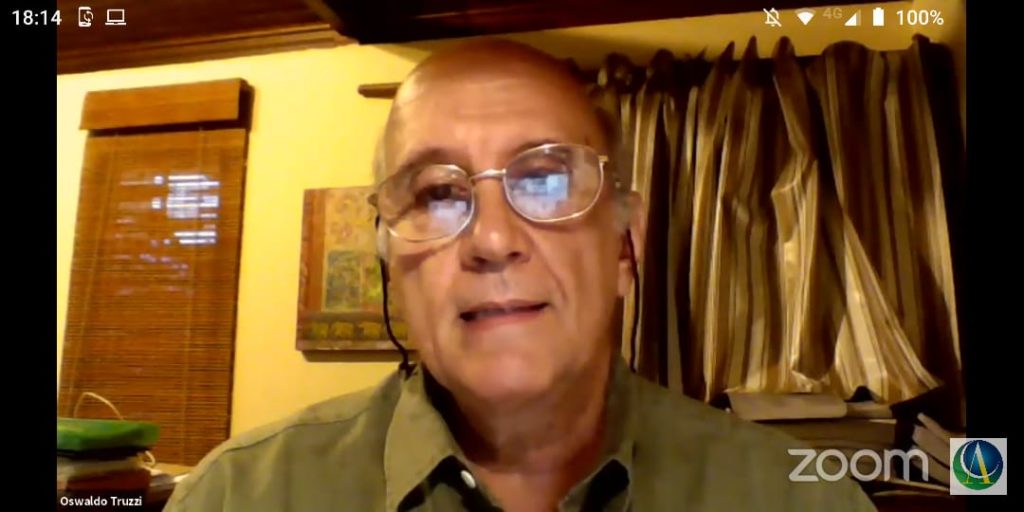São Paulo – A survey of the Arab community in Brazil, conducted by Ibope Inteligência and H2R Pesquisas Avançadas, has paved the way for further studies of Arab immigration to Brazil. such was the conclusion reached by experts on the subject this Monday (30) during the webinar ‘Arab Immigration to Brazil: Analysis and Interpretations.’ The survey was commissioned by the Arab Brazilian Chamber of Commerce (ABCC), and the online debate was hosted by the Arab House, which the ABCC launched this year.
The webinar saw H2R Pesquisas Avançadas director Alessandra Frisso present information from the survey. The holder of a doctorate degree in International Law from the University of São Paulo (USP), Salem Nasser, who’s of Arab descent, said much of the data came as a surprise even to him, despite his involvement with the community. “Even for us, who have been immersed in this environment and who have experienced this history since early childhood, there’s a lot to this survey that has come as a surprise, such as new facts and information. It’s like getting a treasure trove delivered to you, a gift that’s full of surprises,” he argued.

Nasser said numbers regarding nationality, for instance, which show that 25% of respondents are unable to tell what country their ancestors hailed from, prompt further inquiries. “There are a few things that the numbers themselves fail to fully reveal. The profile of the Arabcommunity shows that the majority, 27%, are aware that they are of Lebanese origin, but 25% are only aware that they are Arab, and not much more. Does it mean that they descend from earlier Syrian immigrants? Or Lebanese? Or from other Arab nationalities?”, he inquired.
He believes that by quantifying people from other nationalities, like Saudis and Somalis, the survey also speaks to the intercommunity relations of Arabs in Brazil. “If someone who’s part of the traditional Syrian community such as myself cannot tell that clearly, it means that parts of the Arab community are segregated and mutually unaware of themselves,” he said.
- Here’s more on the event: New emigration wave starting in Lebanon
Trade and social mobility
Federal University of São Carlos full professor and postgraduate Sociology professor Oswaldo Truzzi (pictured at the top of this page) mentioned aspects that warrant further questioning. One of them is the disparity between the Arab and Brazilian communities when it comes to distribution in social classes. “When it comes to social mobility, it is remarkable and striking that 45% of the Arab population are in the A and B classes. In the broader Brazilian population, that rate is 24%. And also that only 13% of the Arab population are in the D and E classes. How does that happen? Of course, I do not intend to naturalize that by simply writing it off to Arab blood. Somehow, the history of the colony led to this very successful socioeconomic mobility.”
For Truzzi, that social mobility explains another factor: educational level. The survey showed that 29% of Arabs or Arab descendants are college-educated. “That education was achieved here [in Brazil], a welcoming country. The same holds true of insertion in trade, in business, in the liberal professions,” he said. the numbers also show that those who have graduated college are mostly in business-related fields.
Immigrants and gender
The sociologist also stressed that gender information regarding Arabs does not match that of the bigger Brazilian population. Sixty percent of the Arab community are male. “That’s different than the national average, where women are in greater number. I wonder if that has to do with the fact that immigrants were mostly men. Another piece of information has to do with first-generation immigrants. Sixty-eight percent said the first generation to immigrate was their father’s, and only 34% said it was their mother’s. I believe that those things are connected, and that they indicate that immigration, particularly more recently, is predominantly male,” the professor said.
Region and religion
Geographic distribution of the community also jumped to Truzzi’s attention. “The relevance of the Arab community in the Northeast caught my attention. That’s probably due to a bias of mine, since I have mostly studied the colony in São Paulo. I find this to be very interesting information, and it leads to a whole new agenda.”

Truzzi said information regarding religion is also highly relevant, since, within the Arab community, Muslims (20%) tend to care the most about preserving the Arabic language, which the Koran utilizes. Nasser, in turn, said he would like to delve deeper into the data on Evangelicals (17%) and Catholics (44%), which could provide a more detailed picture of Arab identity in Brazil. He wonders who these Evangelicals are, and whether the Christian denomination also includes Maronite Catholics.
This was the first event ever hosted by the Arab House, an organization established by the ABCC this year. The webinar is available on the ABCC’s YouTube channel. It also featured ABCC secretary-general Tamer Mansour and president Rubens Hannun, who served as moderator. Hannun said the discussion was also helpful in enabling an understanding of how the information from this initial survey can be worked on going forward. “We are adding up different contributions. We are taking advantage of this to follow through with the survey, with new information that will lead to greater and greater knowledge,” the president of the Arab Brazilian Chamber said.
Also featured was the director of the Latin American Studies and Cultures Center (LASCC) of Lebanon’s Holy Spirit University of Kaslik (USEK), Roberto Khatlab, who discussed the history of Arab migration flows to Brazil.
Check out past stories on the survey:
- Arabs, descendants are 6% of Brazil’s population: survey
- Arab descendants: 41% are third-generation immigrants
- Ten pct of Brazil business leaders are Arab or descendants
Translated by Gabriel Pomerancblum




